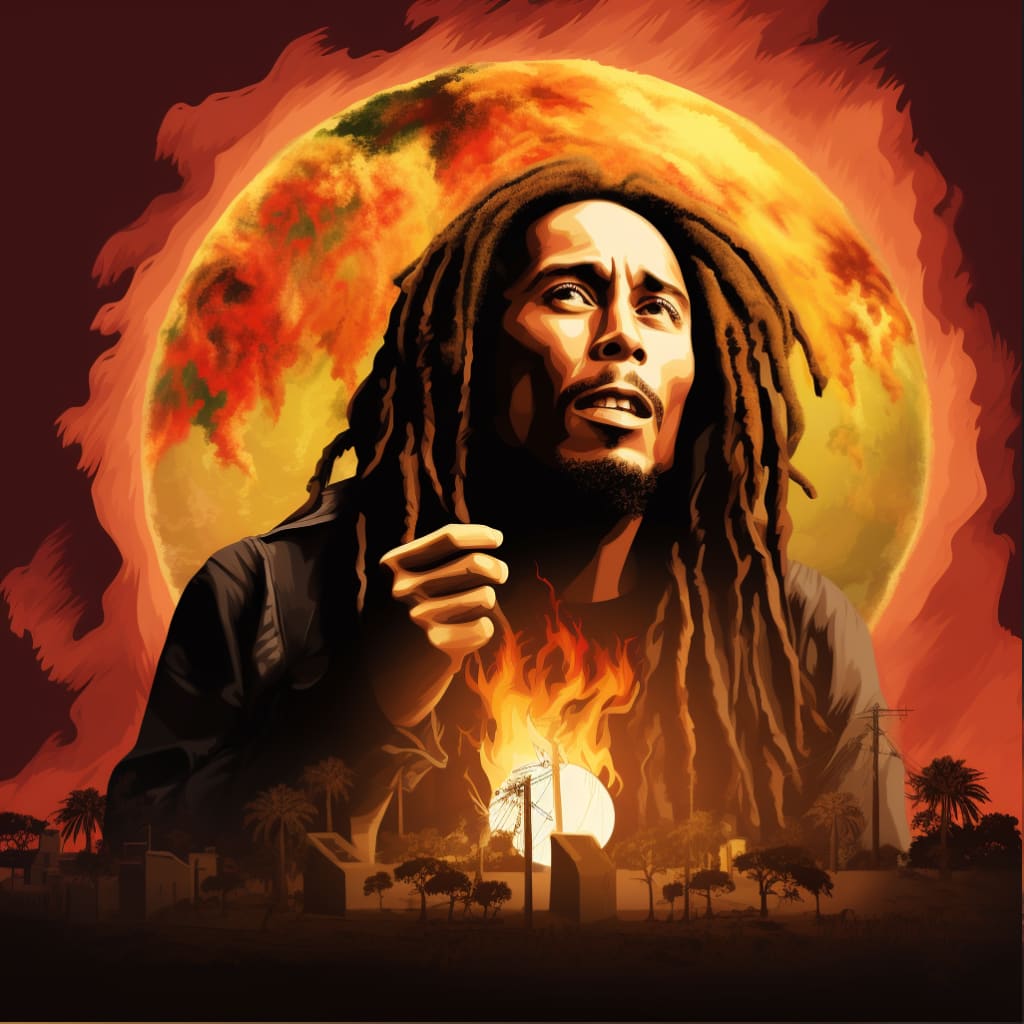Chanting Down Babylon in the Anthropocene
The Earth Vex Now

The music of Bob Marley and the Wailers has always been a guiding force in my life. From as early as 1973, when I lived in Mona Heights, Jamaica, and sat in the living room of Micky Mowatt, or Jah Love as we called him after the name of his sound system, I still remember the first time I heard "Rastaman Chant" from the Burnin’ album.
Hear the words of the Rastaman say
"Babylon, you throne gone down, gone down
Babylon, you throne gone down"
Ten years later in Miami, and still mourning Bob's death, I remember playing "Chant Down Babylon" from Confrontation until the needle almost went through the grooves on the vinyl:
Men see their dreams and aspirations
Crumble in front of their face
And all of their wicked intention
To destroy the human race
And how I know - and how I know - and that's how I know:
A Reggae music, make we chant down Babylon
With music, make we chant down Babylon
During the lockdown, when most of the poems from my latest poetry collection, Archipelagos, were written, I played the music of the Wailers nonstop. In fact, I've used a part of a quote from an interview that Bob gave in 1983 as an epigram:
When dis blood claat Earth vex--cause de Earth vex now, yu know. The Earth, itself, vex! Because dem underrate the Earth, yu know. And the Earth vex! Because the Earth is the Lord’s and the fullness thereof. So the Earth vex. And when time the Earth go back fe him spot—because dem tell you seh, if there was a river running through here and a man draw it up and put the land there and build it up fe him way, the river is coming back fe its place. Dat mean every hole way dem dig inna Earth way nuh rightful, the Earth want back that blood claat space. And you know seh dem have whole heap a things underneath. That mean when de Earth come wid all a five-minute earthquake—cause a earthquake dem a mek--dem mek blood claat earthquake, you know—it going to be red, man.
What Bob saw then and that we continue to experience, systemic oppression and environmental destruction—Babylon- is not sustainable. And without changes to our lifestyle, we are heading for unimaginable disasters--the impetus for the poems in Archipelagos.
Archipelagos begins with a four-part poem, “Colonial Discourse,” which describes the exploitation of Africans and indigenous peoples by some of the most notorious mass murderers in history:
“At the brink of dawn,” the Prefect of the Ocean
fleet. aboard the Niña, limping towards the coast
of Lisbon, blocked the path of a flea that had crawled
from the sleeve of his jacket over maps of the islands
of which he had taken “possession...without anyone
objecting” -- not even the natives, idol worshippers,
who, although they lived “like beasts...naked
as the day they were born,” were by nature
cowards and guaranteed his sovereign monarchs
that with fifty men, they could be governed.
The third section of “Colonial Discourse” explores the exploitative mindset that generated wealth for King Leopold II of Belgium:
“At the brink of dawn,” Leopold II paused
to admire the blood oranges in his greenhouse
in Laeken and felt an itch in his groin,
like on his fiftieth birthday in London
when he was accused of consorting with ten
to fifteen-year-old girls whom the mistress
of the “disorderly house” had assured him
were virgins. It was a mild irritation that in time
would go away like the dip in shipments of ivory
and rubber, whose profits he had hidden
from the Belgian Parliament in the double ledgers
he kept separate from the tally of hands,
harvested from African men, who, although their wives
had been held hostage, failed to meet their quota
of sap from the rubber vines.
The acquisitive greed of the colonizers, as Amitav Ghosh pointed out in The Nutmeg's Curse, has been intertwined into nearly every aspect of human endeavor, including our mechanistic view of the universe, and reveals itself in ways such as othering. Poems such as “Target Practice,” “Precautionary Measures,” and “Bad Friday” highlight the effects of othering. “Bad Friday,” which illustrates the impact of internalized othering, recalls the Coral Gardens Massacre:
Years after the beasts of Babylon
swooped down on Pinnacle and scatter
Rastafari, whose wisdom became flesh
for I to unlearn the folly of Rose Hall,
bald heads grab I in Coral Gardens
on a bright Good Friday morning and scream,
“Rasta bwai, you a go dead today.”
“The moral arc of the universe bends towards justice,” as Dr. King once reminded us, and in the poem “A Reckoning,” the destruction of Edward Colston’s statue in Bristol is connected to the death of George Floyd:
And for over a hundred years,
the descendants of Pero Jones, who grew tired
of the pain—like the kind George Floyd’s
brother confessed in his testimony before Congress—
the daily insult when they faced Edward Colston’s
statue, “Erected by the citizens of Bristol
as a memorial to one of the most virtuous and wise
sons of the city,” that sneered when they crossed
the footbridge, which Bristolians eventually named
after their ancestor, they grabbed their hammers,
enough rope to support the weight of a man,
tore down the statue and dumped it in Bristol Harbor
But is “total destruction the only solution,” as Bob Marley sang on "Real Situation" from the Uprising album? In “The Admiral,” the collection circles back to Christopher Columbus as the epitome of colonial greed and offers a way out through the teachings of Marcus Garvey:
The Admiral grunted goodbye, and as he staggered
up Main Street, he wondered when he’d hear,
the sound of Africans marching along the Roaring
River, sunlight glinting off their machetes, the tools
of their ancestors, chanting the words of their liberator,
“We must emancipate ourselves from mental slavery.”
Rastafari, who regard Marcus Garvey as a prophet, has always urged living in communion with nature. The first Rastafari community of Pinnacle, founded by Leonard Howell, was a thriving, self-sufficient community until Babylon destroyed it. One of the unintended consequences of Pinnacle’s destruction was the dispersion of the teachings of Rastafari to places like Trench Town, where Bob Marley spent his formative years. Rastafari found a fertile vessel in Bob Marley, who spread Rastafari's livity to the world. I hope it's not too late to heed his message.
Sources:
The Wailers. “Rastaman Chant.” Burnin’, Island Records, 1973.
Cooper, Carolyn. “Bring in all Rastas, dead or alive!” The Gleaner Online, 7 Apr. 2013, jamaica-gleaner.com/article/focus/20130407/bring-all-rastas-dead-or-alive.
“Rastas Beaten, Forcibly Trimmed of Their Locks After Coral Gardens.” The Jamaica Observer, 16 Dec. 2015
“Bob Marley.” Facebook, [www.facebook.com/BobMarley/videos/the-eart-vex-bob-talks-about-the-environment/358983751473511/].
Marley, Bob. “Real Situation.” Uprising, Tuff Gong/Island Records, 1980.
---. “Chant Down Babylon.” Confrontation, Tuff Gong/Island Records, 1983.
Smith, Douglas, and Jabulani Tafari. Rastafari in the 21st Century: What Life Has Taught I&I – Volume 1 Tribute to the Rastafari Elders.
Smith, Mychal Denzel. "The Truth About 'The Arc Of The Moral Universe'." HuffPost, 18 Jan. 2018, [www.huffpost.com/entry/opinion-smith-obama-king_n_5a5903e0e4b04f3c55a252a4]
About the Creator
Geoffrey Philp
I am a Jamaican writer. I write poems (haiku & haibun), stories & essays about climate change, Marcus Garvey, music icons such as Bob Marley, and the craft of writing through personal reflection & societal engagement.






Comments (1)
This is a great piece